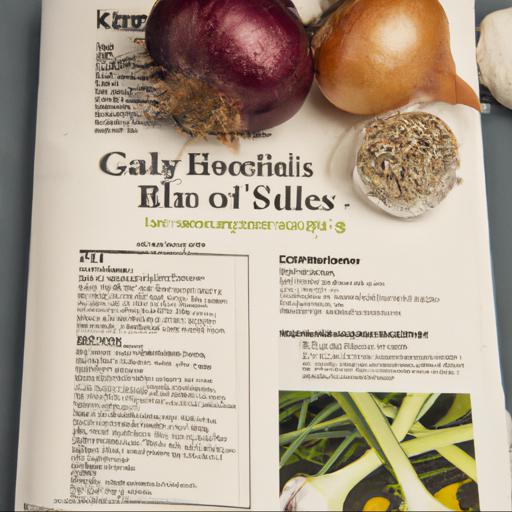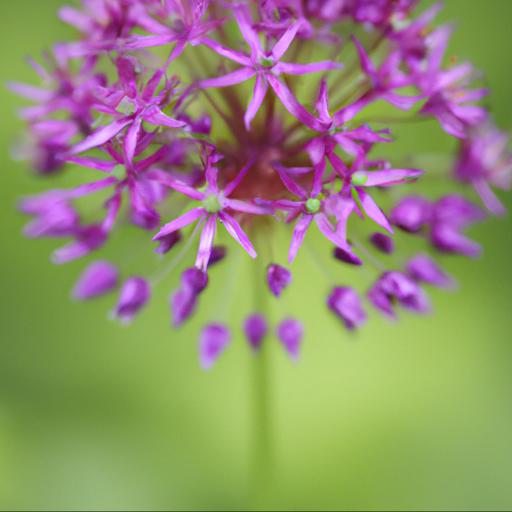Allium atlas is an ornamental onion found in gardens around the world. It is a member of the Alliaceae family and is native to the Mediterranean region.
It is a hardy perennial that grows in a variety of climates and soils. Allium atlas is prized for its showy purple flowers and its ability to attract bees and other pollinators. It is also a great addition to any garden as it is easy to care for and adds a splash of color to the landscape.
Allium atlas is a versatile plant that can be used in a variety of ways, from adding texture and color to flower beds to providing a fragrant scent in the garden.
Benefits of allium atlas: health and culinary uses

Allium atlas is a wonderfully versatile bulb that can be used in both culinary and medicinal applications. As a UK Garden expert, I’m pleased to provide more details about the various benefits of incorporating this bulb into your gardening regime. From a culinary standpoint, Allium atlas provides a mild onion-like flavor that enhances the taste of many dishes.
It can be roasted, sautéed, and mixed into salads for a delicious oniony taste. It makes for a great addition to soups and stews.
In terms of medicinal qualities, Allium atlas has been used for centuries for its anti-inflammatory and anti-bacterial properties. It can be eaten raw or used as an ingredient in natural health tonics. It is especially effective among those that suffer from allergies, as the bulb can quickly break down histamines.
Additionally, it has a number of potent antioxidants that help strengthen the immune system. Finally, the Allium atlas bulb can also be used as an ornamental addition to any garden.
The bulb features a unique shape and can be planted in windowsills or flowerpots. Its small size makes it ideal for container gardening. All in all, Allium atlas has a number of different uses that make it a great addition to gardens large and small.
It adds flavor to dishes of all varieties, helps to reduce inflammation and allergic reactions, and can be used to spice up the landscape. If you’re looking to increase the variety and usefulness of your garden, then Allium atlas is certainly worth a look.
Growing allium atlas: tips and tricks

When it comes to the richly colorful world of gardening, allium atlas stands out for its eye-catching petals that even hummingbirds pause to appreciate. For UK gardeners, this is a stunning perennial that can add a sense of vibrancy and vibrancy to your garden.
Growing allium atlas can be a challenging experience, but with a few tips and tricks, you can create an attractive display that can last throughout the season. The first key to successful allium atlas gardening is choosing the right variety for the climate and conditions of your garden. In the United Kingdom, varieties such as Allium atlas ‘Shooting Star’ are well-adapted for growing in cooler climates and thrives in partial sun to full sun.
Planting should take place in late spring. A well-drained, moist soil is essential and a soil-based compost will generally suffice, though a perennial and bulb fertilizer can be added to the hole when planting. Planting depth and spacing are also important components of successful allium atlas growth.
Bulbs should be planted with their pointed tips facing upwards and with a depth of around three times their diameter. Spacing between individual bulbs should be around 5-7cm.
When all of the bulbs have been planted, cover with a layer of soil, followed by a 5cm layer of compost or mulch to keep them from drying out. Water your allium atlas well throughout the growing season and then cut off the spent flower heads after blooming.
Deadheading will ensure that the plant does not use up energy on developing seed and will ensure that new flowers will form. A light trim after flowering is recommended to keep the plant neat, tidy and neat. By following the above tips, UK gardeners can quickly create an eye-catching display of allium atlas in their garden.
From the soil preparation to the deadheading and trimming, each step plays an integral role in the health and beauty of this stunning perennial.
Recipes featuring allium atlas

As a UK garden expert, I would say that Allium atlas is one of the most versatile vegetables to be found in any garden. Alliums are already staples of many traditional dishes, such as French Onion Soup and Greek Efros soup.
Their delicate onion flavour and the unique shape of their edible bulbs make them a highly adaptable ingredient, perfect for creating unique and delicious recipes. In Greece, an Allium atlas-based recipe called ‘Fasolada’ is widespread. This vegetarian dish is based on cannellini beans and a stock of aromatic vegetables, including tomatoes, onions, carrots and celery.
The Allium atlas bulb is finely chopped and added last. The result is a hearty warm soup with a sweet onion flavour that is enjoyed by many.
In France, you can make the classic ‘Soupe aux oignons Gratinée’. The recipe calls for a base of broth, onions and garlic, but there’s a twist- Allium atlas is added for an extra kick of onion flavour. This dish is then finished by adding cheese to the top, and then baked until golden brown.
The end result is a deliciously rich and creamy soup that is sure to impress. These are just two well-known recipes that feature Allium atlas, but there are plenty of creative ways to utilise this versatile ingredient.
Whether you’re making a hearty soup, a unique salad or even a tasty pizza topping, the sweet onion flavour of the Allium atlas bulb has the potential to make any dish delicious. Let’s get creative in the kitchen and learn to make the most of this special vegetable.
Our video recommendation
Bottom Line
Allium atlas is a species of flowering plant in the Alliaceae family. It is native to the Mediterranean region, where it can be found in a variety of habitats. It is an ornamental plant, and its bulbs are edible.
Its white, star-shaped flowers are very attractive, and its leaves are long, narrow and pointed. Allium atlas is a hardy plant and is easy to grow, requiring little maintenance and water.
It is a great addition to any garden, and makes a beautiful cut flower.
FAQ
What is the scientific name of Allium atlas?
The scientific name of Allium atlas is Allium atlanticum.
What is the origin of Allium atlas?
Allium atlas is a species of flowering plant in the lily family, native to the Mediterranean region. It is believed to have originated in the Atlas Mountains of North Africa.
What are the uses of Allium atlas?
Allium atlas is an ornamental onion plant that is used in gardens and landscapes for its attractive purple flowers. It is also used as a culinary herb, as its leaves and bulbs can be eaten. Additionally, Allium atlas has medicinal properties and is used to treat a variety of ailments, such as headaches, colds, and digestive issues.
What are the health benefits of Allium atlas?
Allium atlas has many health benefits, including reducing inflammation, boosting immunity, improving cardiovascular health, and helping to regulate blood sugar levels. It is also a good source of antioxidants, which can help protect against certain types of cancer. Additionally, Allium atlas can help reduce the risk of stroke, lower cholesterol levels, and reduce the risk of certain types of infections.
How is Allium atlas cultivated?
Allium atlas is typically cultivated from bulbs, which are planted in the fall and then harvested in the summer. It prefers full sun and well-drained soil. It is also important to keep the soil moist and fertilize regularly.
What is the flavor profile of Allium atlas?
The flavor profile of Allium atlas is described as having a mild onion-like flavor with a hint of garlic.

